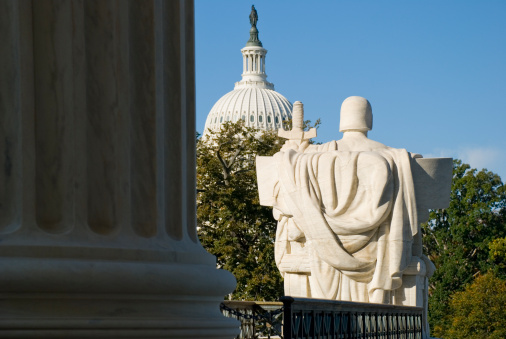
When it comes to rulemaking, “It should no longer be sufficient for agency decision makers to assume that the only hurdle they have to meet is simply not being ‘clearly wrong.'”
If a faceless staff permit writer is not held accountable to the courts, then she probably is not accountable to anybody. Sure, she’s got a boss, who’s got a boss, whose boss is a political appointee who owes her job to a president who is accountable to the electorate. Even in theory, that is a very attenuated kind of accountability.
And if you have worked at an agency, you know that in practice the political appointees routinely defer to the career staff on the technical matters that are often the subject of litigation and the object of Chevron U.S.A. v. Natural Resources Defense Council deference. So, in many or even most cases, the agency leadership itself is not likely to provide meaningful oversight. This leaves the courts as an essential, and often the only meaningful, check and balance on bureaucratic power.
If you, like me, are uncomfortable with the rise of what I will call “the administrative state,” then the concept of largely unfettered deference, whether under Chevron or the Administrative Procedure Act (APA), has to make you squirm.
Chevron deference operates on the theory that the rule of law will be enhanced if the judicial branch defers to the technical expertise of the career staff in the agencies. But all too often the reality is that, as Professor Epstein has put it, the “bureaucrats will be more intent on expanding their power than behaving like disinterested experts whose first allegiance is to the rule of law.”
Just consider what a senior U.S. Environmental Protection Agency (EPA) official recently said at a public meeting when asked about a decision that he was about to issue. When asked if he was worried that the decision would be challenged, he replied “no, because we will win as long as our decision is not clearly wrong.” The Chevron doctrine emboldens bad decision-making.
Career agency staff members are people with real power, in large part because of their technical expertise. But if that same expertise exempts them from accountability to the courts, then they are effectively not accountable to anybody. Power without accountability is never a good thing in a democracy.
The irony is that this deference is completely unnecessary. For nearly thirty years, the courts have deferred to the experts in the agencies under Chevron because of a perceived helplessness: it’s all so “confusing” for a judge; and when you’re confused, you “go with the agency.” But for at least the last twenty of those years, the same courts have been showing they are actually quite capable of evaluating the judgments of “experts.”
The context is different, of course, but the courts have demonstrated their ability to wade into highly technical areas following Daubert v. Merrill Dow Pharmaceuticals and its progeny. In those cases, the federal courts have taken on the role of “gatekeepers” by assessing expert evidence for reliability before allowing it to be admitted.
Daubert has required the courts to weigh in on matters of real scientific and technical controversy and to do so with complex and consequential litigation hanging in the balance. Even if Daubert has not been an unqualified success, it has enabled the federal courts, however imperfectly, to fulfill an essential judicial function.
Daubert empowers the courts to ensure that the “experts,” simply by virtue of their proclaimed expertise, do not hold unchecked sway over the outcome of processes that the Constitution delegated to our courts. Chevron, in contrast, has caused the federal judiciary to abdicate a parallel, and equally essential, function.
So what we should do?
Again, I am not so naive as to think that Chevron will be going away any time soon. I am also realistic enough to know that there is no single solution. Certainly, some of the responsibility must fall on Congress to be clearer when it delegates responsibility to an agency about what it can, and cannot, do.
Tailored amendments to the APA could be another response: to better define the degree of review that courts should bring to bear when reviewing agencies’ technical decisions, especially today when technical expertise is no longer uniquely, or even primarily, housed in regulatory agencies.
And, finally, I would argue that the courts should do more themselves, as they do under Daubert. In so doing, they should demand more rigor as well from the agencies that are defending their actions. It should no longer be sufficient for agency decision makers to assume that the only hurdle they have to meet is simply not being “clearly wrong.”
This is the final essay of a four-part series that draws on Ms. Klee’s remarks as the keynote speaker at the Penn Program on Regulation’s annual regulation dinner, held earlier this year at the University of Pennsylvania Law School.




